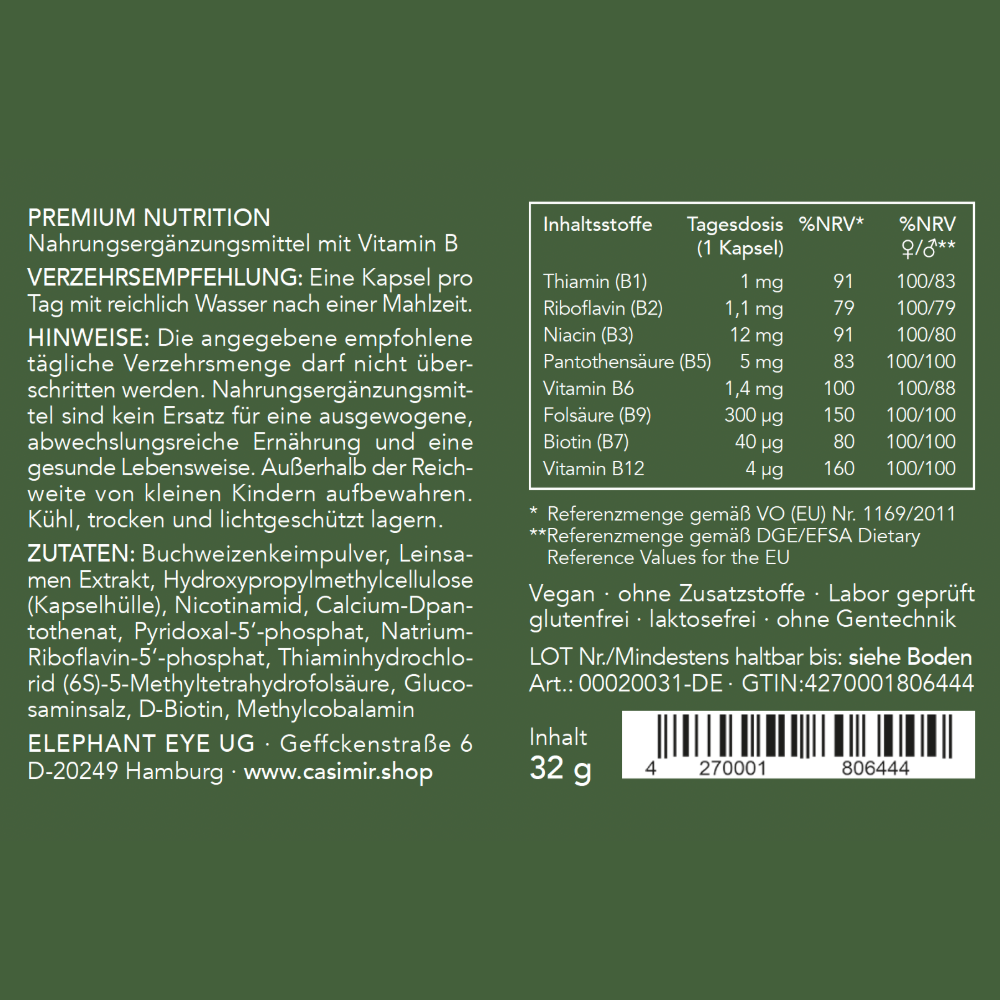THE VITALIZER | B COMPLEX | FOR WOMEN
Energy & Nervous System
vitamin B complex
90 capsules
Optimally dosed for women
This B-complex revolutionizes your vitality!
All 8 B vitamins in one capsule combined with the superfood buckwheat - for energy production, metabolism, immune system, a strong nervous system and more balance. THE VITALIZER is specially dosed for women.
Discover the essence of vitality with our B-complex!
Casimir are nutritional supplements dosed specifically for women - for health, performance and beauty. Nutritional supplements for women already exist - but none of them are dosed specifically for women. And that's exactly what we do differently! Casimir is the first supplement brand ever to develop its products according to female dosage guidelines. The recommended daily requirement of micronutrients is therefore based on women's values.
- The B vitamins are essential nutrients. They play a crucial role in energy metabolism and can help reduce tiredness and exhaustion – for more energy in everyday life.
- Gender-based
- Optimally dosed for women
- Easy to swallow
- Can made from 100% recycled plastic and recyclable
- 3-month supply
- Regular price
-
€30,00 - Regular price
-
- Sale price
-
€30,00 - Unit price
-
€1.250,00 / per kg
Couldn't load pickup availability
Ready to ship immediately: Delivery time: 1-3 working days
Share




THE VITALIZER | B COMPLEX | FOR WOMEN
- Regular price
-
€30,00 - Regular price
-
- Sale price
-
€30,00 - Unit price
-
€1.250,00 / per kg
DESCRIPTION & INGREDIENTS
About B vitamins
The eight B vitamins are water-soluble vitamins and - with the exception of vitamin B12 - cannot be stored in the body for long. Therefore, they must be replenished regularly. Even though each B vitamin has its own functions, they are largely dependent on each other and work perfectly like clockwork. In order to achieve the greatest benefit from this interaction, all B vitamins should be in harmony, which is why they are offered here as a complex.
The B vitamins are responsible for energy metabolism, nerve cells, formation of new blood cells, maintenance of healthy skin cells and brain cells, brain function and fat metabolism.
Since vitamin B12 is mainly found in animal products, additional intake is essential for people with a vegetarian or vegan diet.
Vitamin B1 (thiamine):
Supports energy production and is essential for nerve function. It helps convert food into energy and plays an important role in muscle contraction.
Vitamin B1 (thiamine) contributes to:
- to a normal energy metabolism
- to normal functioning of the nervous system
- to normal psychological function
- to normal heart function
Symptoms of vitamin B1 deficiency:
- fatigue
- weight loss
- confusion
- memory disorders
Increased vitamin B1 requirement:
- pregnancy
- breastfeeding
- high alcohol consumption
- certain diseases
Vitamin B2 (riboflavin)
Is essential for growth, eyes, skin and the production of red blood cells. It supports the body in the breakdown of fatty acids.
Vitamin B2, also known as riboflavin, is an important component of enzymes needed in energy metabolism. It also supports reactions that detoxify foreign substances, such as medications.
A vitamin B2 deficiency can lead to growth disorders, skin diseases and inflammation of the mucous membranes, mainly in the mouth, on the oral mucous membranes and in the corners of the mouth. Since vitamin B2 is not stored in the body, regular intake is important. The best sources of vitamin B2 are milk and dairy products, which should be on the menu every day. But meat, fish, eggs and whole grain products also supply the body with vitamin B2. More vitamin B2 is needed with an active lifestyle, after serious illness and operations and when taking antidepressants.
Vitamin B2 (riboflavin) contributes to:
- to a normal energy metabolism
- to normal functioning of the nervous system
- to maintain normal skin
- to maintain normal mucous membranes
- to normal iron metabolism
- to maintain normal vision
- to maintain normal red blood cells
- to reduce tiredness and fatigue
- protect cells from oxidative stress
Symptoms of vitamin B2 deficiency:
- skin inflammations
- angular cheilitis
- light-sensitive eyes
Increased vitamin B2 requirement:
- pregnancy
- breastfeeding
- growth phases
- intensive sports
Vitamin B3 (niacin)
Helps produce energy from the foods we eat and is necessary for DNA repair and other cellular functions.
Vitamin B3 contributes to:
- to a normal energy metabolism
- to normal functioning of the nervous system
- to normal psychological function
- to maintain normal skin
- to maintain normal mucous membranes
- to reduce tiredness and fatigue
Symptoms of vitamin B3 deficiency:
- skin inflammations
- Diarrhea
- dementia
Increased vitamin B3 requirement:
- pregnancy
- breastfeeding
- chronic diseases
vitamin B5 (pantothenic acid)
Supports the production of hormones and cholesterol and helps convert food into energy.
Vitamin B5 contributes to:
- to a normal energy metabolism
- to normal mental performance
- to reduce tiredness and fatigue
- to normal synthesis and metabolism of steroid hormones, vitamin D and some neurotransmitters
Symptoms of vitamin B5 deficiency:
- fatigue
- stomach pain
- sleep disorders
Increased vitamin B5 requirement:
- pregnancy
- breastfeeding
- stress
- growth phases
About Vitamin B6
The entire fat metabolism, the immune system, the nervous system and the hormonal balance are controlled by vitamin B6, which also has positive effects on depression.
B6 is important for brain development, brain function and supports the production of serotonin, which has a positive influence on mood, sleep and well-being, especially on the topic of irritability.
Vitamin B6 contributes to:
- to normal cysteine synthesis
- to a normal energy metabolism
- to normal functioning of the nervous system
- to a normal homocysteine metabolism
- to normal protein and glycogen metabolism
- to normal psychological function
- to normal red blood cell formation
- to normal functioning of the immune system
- to reduce tiredness and fatigue
- to regulate hormone activity
Symptoms of vitamin B6 deficiency:
- skin inflammations
- fatigue
- nerve irritations
Increased vitamin B6 requirement:
- pregnancy
- breastfeeding
- high alcohol consumption
- certain medications
Vitamin B7 (biotin)
Often referred to as the "beauty vitamin," it supports healthy skin, hair, and nails. It also plays a role in energy metabolism.
Vitamin B7 contributes to:
- to a normal energy metabolism
- to maintain normal skin
- to maintain normal mucous membranes
- to maintain normal hair
- to normal psychological function
- to a normal metabolism of macronutrients
- to normal functioning of the nervous system
Symptoms of vitamin B7 deficiency:
- skin problems
- hair loss
- fatigue
Increased vitamin B7 requirement:
- pregnancy
- breastfeeding
- high alcohol consumption
vitamin B9 (folic acid)
Plays a key role in many body functions, including DNA synthesis and repair. It is also important for pregnant women as it may prevent birth defects.
Vitamin B9 contributes to:
- to a normal function of the immune system (physical defense)
- to reduce tiredness and fatigue
- to normal psychological function
- to normal blood formation
- to normal amino acid synthesis
- to a normal homocysteine metabolism
- to normal cell division
- to the growth of maternal tissue during pregnancy
Symptoms of vitamin B9 deficiency:
- fatigue
- paleness
- heart palpitations
Increased vitamin B9 requirement:
- pregnancy
- breastfeeding
- high alcohol consumption
- certain medications
vitamin B12
B12 is multi-talented and performs vital body functions. It is involved in many metabolic processes, such as energy production, the formation of red blood cells, maintaining healthy nerve cells, the production of DNA and RNA, and cell division. Like B6, B12 supports the formation of serotonin, the so-called happiness hormone, which contributes to general well-being and a better mood. Both B vitamins are coordinated with each other and work best in combination.
vitaminB12 (cobalamin) contributes to:
- to a normal energy metabolism
- to normal functioning of the nervous system
- to a normal homocysteine metabolism
- to normal psychological function
- to normal red blood cell formation
- to normal functioning of the immune system
- to reduce tiredness and fatigue
- to normal cell division
Symptoms of vitamin B12 deficiency:
- anemia
- fatigue
- nerve disorders
Increased vitamin B12 requirement:
- Older people
- vegetarians / vegans
- in certain diseases
About buckwheat:
Buckwheat is not a grain, but belongs to the sweet grass family and is therefore gluten-free. Only the maturation into a germ makes buckwheat a real superfood with high bioavailability. Like other natural superfoods, buckwheat is characterized by an increased proportion of enzymes, vitamins and minerals. Since buckwheat contains all B vitamins, among other things, it is an ideal supplement to THE VITALIZER.
The gluten-free plant is said to lower blood sugar levels and blood pressure and to help against varicose veins.
BUCKWHEAT CONTAINS, AMONG OTHER THINGS:
- Vitamins: B1, B2, B3, B5, B6, B7, B9, B12
- Minerals: magnesium, phosphorus, potassium, iron, zinc, chromium
- Co-enzymes: flavonoids, Q10 and Omega3
ZUTATEN & HINWEISE
Zutaten:
Buchweizenkeimpulver, Leinsamen Extrakt, Hydroxypropylmethylcellulose (Kapselhülle), Nicotinamid, Calcium-Dpantothenat, Pyridoxal-5‘-phosphat, Natrium- Riboflavin-5‘-phosphat, Thiaminhydrochlorid (6S)-5-Methyltetrahydrofolsäure, Glucosaminsalz, D-Biotin, Methylcobalamin
Verzehrsempfehlung:
Eine Kapsel pro Tag mit reichlich Wasser nach einer Mahlzeit einnehmen.
Hinweise: Die angegebene empfohlene tägliche Verzehrsmenge darf nicht überschritten werden. Nahrungsergänzungsmittel sind kein Ersatz für eine ausgewogene, abwechslungsreiche Ernährung und eine gesunde Lebensweise. Außerhalb der Reichweite von kleinen Kindern aufbewahren. Kühl, trocken und lichtgeschützt lagern.
NUTRIENT VALUES
| Ingredients / daily dose | (= 1 capsule) | %NRV* | % reference value♀** | % reference value♂** |
|---|---|---|---|---|
| Thiamine (B1) | 1 mg | 91 | 100 | 83 |
| Riboflavin (B2) | 1.1 mg | 79 | 100 | 79 |
| Niacin (B3) | 12 mg | 91 | 100 | 80 |
| Pantothenic acid (B5) | 5 mg | 83 | 100 | 100 |
| Vitamin B6 | 1.4 mg | 100 | 100 | 88 |
| Folic acid (B9) | 300 mcg | 150 | 100 | 100 |
| Biotin (B7) | 40 mcg | 80 | 100 | 100 |
| Vitamin B12 | 4 mcg | 160 | 100 | 100 |
*Reference quantity according to Regulation (EU) No. 1169/2011.
** Reference quantity according to DGE / EFSA Dietary Reference Values for the EU
| average nutritional values | Per daily dose (= 1 capsule) | Per 100g |
|---|---|---|
| calorific value | 3 kJ/1 kcal | 1,159 kJ/279 kcal |
| Fat | <0.5g | 2.4g |
| hereof: saturated fatty acids | <0.1g | 0.2g |
| carbohydrates | <0.5g | 48g |
| of which sugar | 0g | 0g |
| protein | <0.5g | 6g |
| Salt | 0g | 0g |
-
vegan
-
Nutrition Reference Value
-
Laboratory tested
-
without genetic technology
-
Gluten free
-
without palm oil
-
Lactose free



